- ABOUT US
- PROGRAM AREAS
- CONSERVATION APPROACH
- EDUCATION
- MULTIMEDIA
2024 Featured Stories
November
NOAA announces funding for local and national coral reef conservation capacity building support grants

NOAA is announcing up to $1.25 million in funding for coral reef conservation under the Ruth D. Gates Grant Program, covering four new projects that address local and national capacity building gaps across domestic coral reef jurisdictions and the Freely Associated States. Recipients will provide approximately $1.25 million in additional, non-federal support to these projects.
October
Socioeconomic Monitoring in Guam: Summary Findings and Trends, 2023

This report presents primary data collected for the National Coral Reef Monitoring Program's second socioeconomic monitoring cycle in Guam, conducted in person with household residents from January to April 2023. It also presents trends between this monitoring cycle and the first (conducted in 2016), as well as summary infographics.
July
Fagatele Bay, a strongly resilient marine sanctuary in American Samoa

Fagatele Bay in the National Marine Sanctuary of American Samoa has shown remarkable resilience despite numerous environmental disturbances over the past four decades, including hurricanes, bleaching events, and crown-of-thorns starfish outbreaks. Surveys held since 1985, led by Dr. Charles Birkeland and his team, reveal a pattern of damage followed by rapid recovery facilitated by crustose coralline algae (CCA). This unique resilience offers hope amid global coral reef declines, highlighting the need for further research on CCA's role in coral recruitment and potential conservation strategies.
May
Anna Rothstein: The Coral Program's 2024 Knauss Fellow

In February, we welcomed our 2024 Knauss fellow, Anna Rothstein. Anna is sponsored by University of Southern California Sea Grant, and received her M.S. in Ecology and Evolution from San Jose State University.
April
Fisheries science with a SMILE!
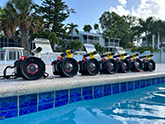
Citizen scientists are SCUBA diving with underwater, laser mounted cameras for the collaborative SMILE Project (Size Matters: Innovative Length Estimates). The cameras are used to obtain fish lengths while underwater, contributing data for management and conservation of economically and ecologically reef fish species.
March
Sharing knowledge at the 2024 U.S. Caribbean Stony Coral Tissue Loss Disease Workshop
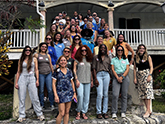
The 2024 U.S. Regional Caribbean Stony Coral Tissue Loss Disease (SCTLD) Workshop convened coral managers, practitioners, and researchers from Florida, Puerto Rico, and the U.S. Virgin Islands (USVI) to exchange information, coordinate disease response efforts, and collaborate on projects across the U.S. Caribbean. The main objectives were to enhance regional coral rescue, share information on bleaching response and monitoring, coordinate restoration planning and implementation, and discuss strategies to expand disease response networks to include other coral disturbances, like bleaching, invasive species, and storm damage.
Coral Reefs are Recognized as National Natural Infrastructure
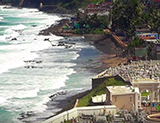
By combining basic scientific research and applied coastal management techniques with policy actions by decision makers, coral reef scientists show that coral reefs are natural infrastructure. This effort was successful because a multidisciplinary team built a solid foundation of science, directly engaged with stakeholders, and committed to novel approaches to coral reef conservation avenues. The culmination of this research and efforts of the U.S. Coral Reef Task Force working group is a national resolution that designates U.S. coral reefs as national, natural infrastructure.
February
Socioeconomic Monitoring in the Caribbean: Travels to the U.S. Virgin Islands and Puerto Rico

NOAA's National Coral Reef Monitoring Program (NCRMP) Socioeconomic Component gathers and monitors a collection of socioeconomic data in seven U.S. coral jurisdictions. Recently, the team traveled to the U.S. Virgin Islands (USVI) to meet with partners and prepare for the 2025 USVI Survey, as well as Puerto Rico to present results and trends from the 2022 Puerto Rico Survey.
January
Understanding the Coral Reef Data Lifecycle

NOAA's National Coral Reef Monitoring Program (NCRMP) Socioeconomic Component gathers and monitors a collection of socioeconomic data in seven U.S. coral jurisdictions. Recently, the team traveled to the U.S. Virgin Islands (USVI) to meet with partners and prepare for the 2025 USVI Survey, as well as Puerto Rico to present results and trends from the 2022 Puerto Rico Survey.
Building Local Coral Reef Management Capacity One Summer at a Time
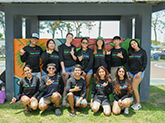
For over two decades, the NOAA Coral Reef Conservation Program has supported the Commonwealth of the Northern Mariana Islands (CNMI) Coral Reef Initiative's annual summer internship program for local post-secondary students to be introduced to various aspects of coral reef management and gain hands-on experience. This investment in building the jurisdiction's local capacity has proven invaluable as the CNMI has seen an astonishing return on its investment, with former interns completing their studies abroad and coming back to fill full-time positions in the CNMI's natural resource management agencies and non-governmental organizations.
About Us

The NOAA Coral Reef Conservation Program was established in 2000 by the Coral Reef Conservation Act. Headquartered in Silver Spring, Maryland, the program is part of NOAA's Office for Coastal Management.

The Coral Reef Information System (CoRIS) is the program's information portal that provides access to NOAA coral reef data and products.
Work With US
U.S. Coral Reef Task Force
Funding Opportunities
Employment
Fellowship Program
Contracting Assistance
Graphic Identifier
Featured Stories Archive
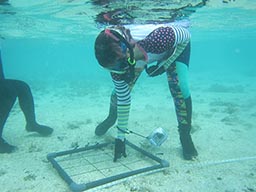
Access the archive of featured stories here...
Feedback
Thank you for visiting NOAA’s Coral Reef Conservation Program online. Please take our website satisfaction survey. We welcome your ideas, comments, and feedback. Questions? Email coralreef@noaa.gov.
Stay Connected
Contact Us
NOAA’s Coral Reef Conservation Program
SSMC4, 10th Floor
1305 East West Highway
Silver Spring, MD 20910
coralreef@noaa.gov
